Beijing reports 79 virus cases
Genome sequencing indicates imported source: municipal CDC
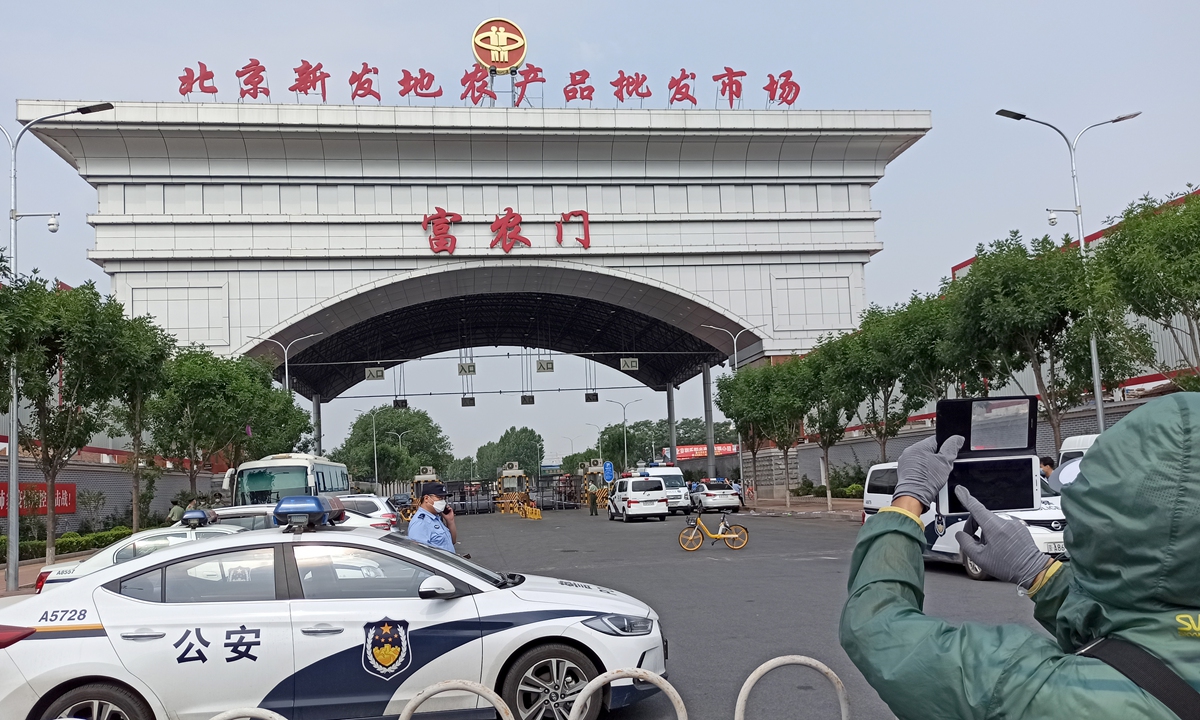
The Xinfadi market in southern Beijing was shut down on Saturday. Photo: cnsphoto
Beijing reacted swiftly after a total of 79 confirmed cases of COVID-19 were reported as of Sunday, taking measures including expanding nucleic acid testing, strengthening management of residential communities in seriously affected districts and starting epidemiological investigations after a cluster of cases was uncovered at the city's largest wholesale food market.The sudden spike in the capital city came after China experienced a short period of calm and it has triggered mounting concerns over a possible second wave of the virus.
Beijing reported 36 new confirmed cases on Sunday to bring a total of 79. Many had direct or indirect contacts with Xinfadi market in the capital's Fengtai district, according to a press conference on Sunday.
Since Friday, health authorities in Beijing acted quickly in response to the emergency and are working against the clock to collect information of anyone in the city who had been to the Xinfadi market or had any contacts with it since from May 30. Anyone who confirmed contact must undergo a nucleic acid test.
Some experts said the strain of the virus detected at Xinfadi might originate from imported cases and they called for more detailed epidemiological investigations to find the source or origin of the new strain.
Fengtai district in southern Beijing has declared a state of "wartime management." The district intends to test all 46,000 residents living in communities in the vicinity of Xinfadi, Zhang Jie, deputy district head of Fengtai, said at a press conference on Sunday.
Xinfadi market is closed and 11 residential communities are under lockdown. Three schools and six kindergartens nearby have been suspended, Chu Junwei, head of Fengtai district, told an early press conference on the same day.
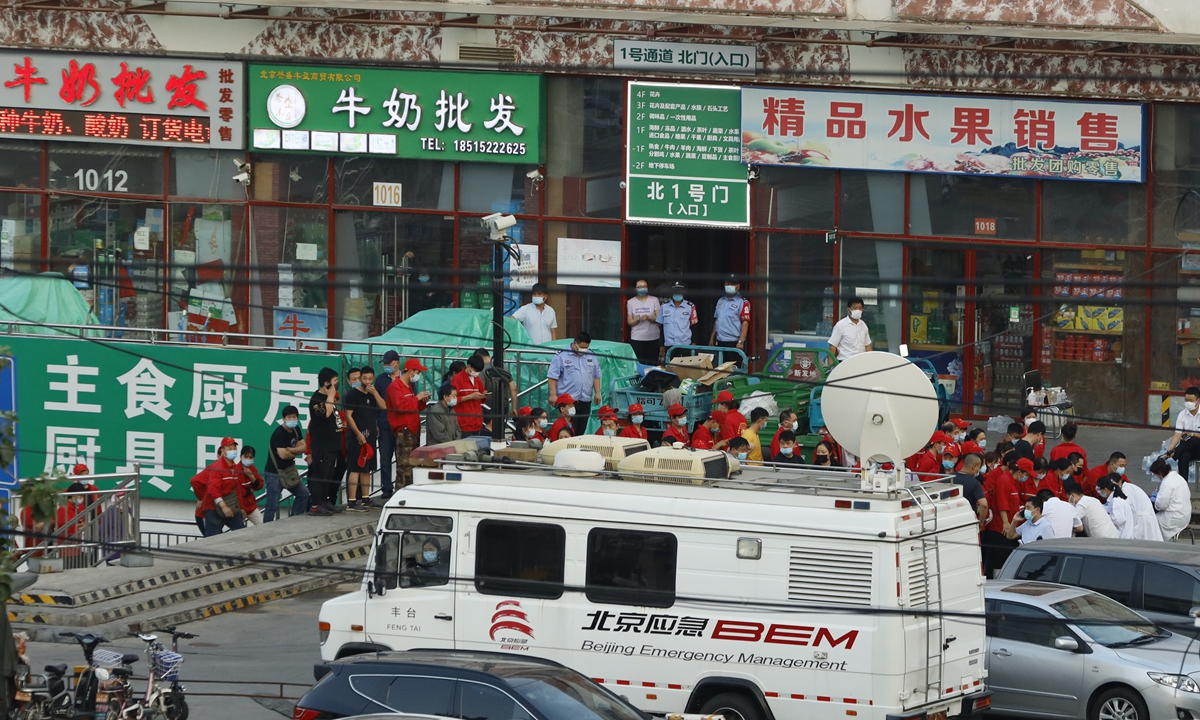
Dealers at the Xinfadi market have their information registered on Friday. Beijing authorities shut down the market after new COVID-19 cases linked the market. Photo: Li Hao/GT
Not a second Wuhan
An official in charge of community work in a sub-district of Fengtai, who asked for anonymity, told the Global Times on Sunday that residential communities in her sub-district have resumed temperature registration, an epidemic control and prevention measure that had been lifted on June 6, when Beijing lowered its COVID-19 response to Level III. More community workers have been deployed to residential community entrances once again to make sure everyone registers.
The other focus is to find those who have recently been to the market. The sub-district is using big data to search for these people, the official said.
After screening, those believed to be at risk of infection will be tested while quarantining at home, the official said.
Aside from Fengtai, many sub-districts in Beijing have upgraded their COVID-19 risk level to Level II from Level III since Saturday. The whole city has increased its guard against the virus again - people who were inclined to take off their masks due to the hot weather are now taking full precautions again. In supermarkets and restaurants, people are conscious of keeping a certain social distance, having their temperature taken before entering and deliberately avoiding gatherings.
Unlike the previous situation when a whole city would upgrade the risk level when a case was spotted, which may have huge impact on people's daily lives, the current risk alert applies to related communities, said Zeng Guang, a chief epidemiologist of the Chinese Center for Disease Control and Prevention (CDC). He noted that the move would help the authorities to curb the virus spread more precisely.
The sudden spike in Beijing has caught the national attention with many worried that a second wave of the coronavirus might have begun.
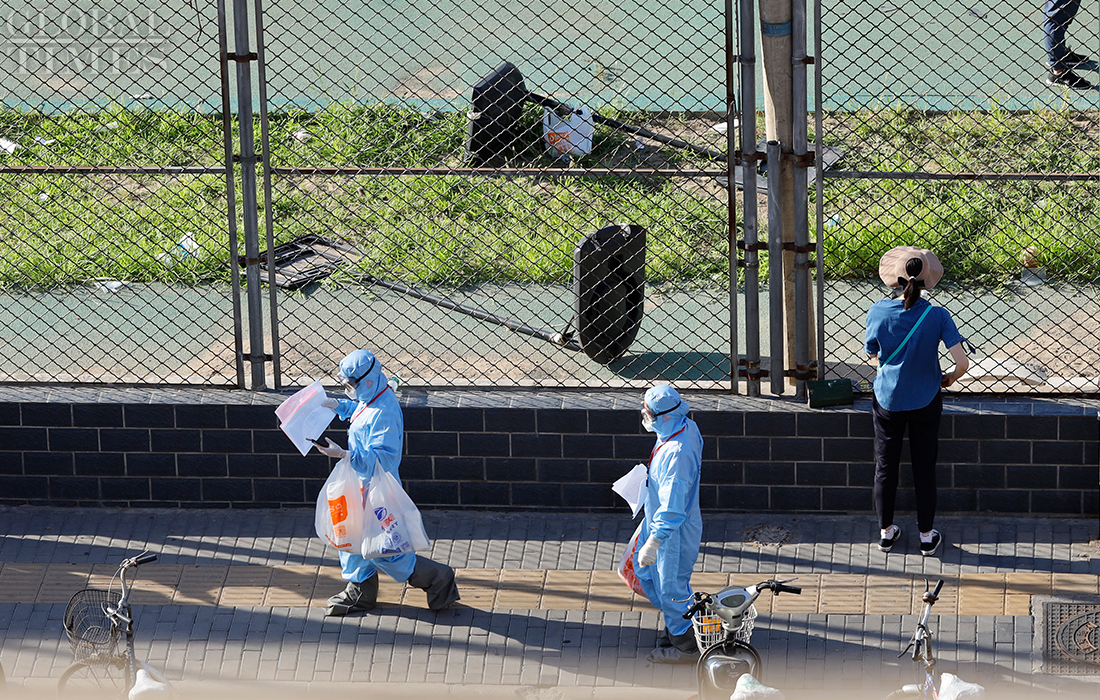
Photo: Li Hao/GT
Some public health experts reached by the Global Times warned that considering the high flows of people at Xinfadi market and the number of close contacts with confirmed cases, slight omissions of screening may increase the risk of virus spreading, meaning that Beijing is facing an arduous mission in tracking all of the contacts.But it is still too early to judge the scale of the outbreak when the source of infections remains unknown. The number of confirmed cases over the next two weeks will be a decisive indicator for whether the regional COVID-19 outbreak in Beijing will trigger a second wave, Wang Guangfa, a respiratory expert at Peking University First Hospital in Beijing, told the Global Times on Sunday.
Wang said that "if the number of new cases confirmed daily show an upward trend within the average incubation period of virus, that is 7 days, Beijing should consider imposing stronger anti-epidemic measures, so new wave of the outbreak could be properly controlled."
Different from the outbreak in Wuhan, the cluster of infections in Beijing comes at a time when China has gained rich experience in coping with COVID-19 - first in Wuhan, Central China's Hubei Province, and second in Shulan, Northeast China's Jilin Province. Therefore a similar scale of lockdown will not be seen in Beijing, Wang noted.
Zeng from CDC agreed that Beijing will not become a second Wuhan, with no need to shut down the city, and the virus will not spread to other places across the country. The epidemic in Beijing is more of a short-term outbreak. The number of cases is likely to increase for a few days, but then it will be brought under control, the senior epidemiologist said.
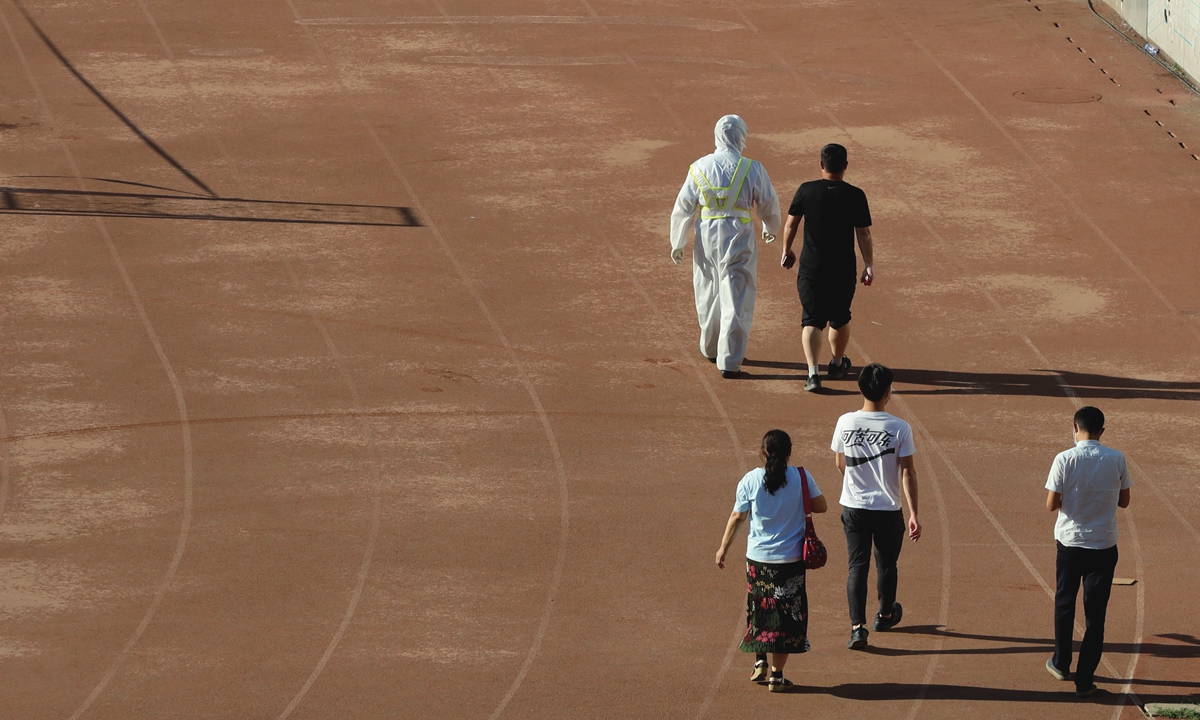
Residents follow a health worker to a testing station at a sports center in Xicheng district after Beijing municipal government demanded all residents who visited the Xinfadi food market since May 30 to undergo nucleic acid tests for possible infection with the novel coronavirus after the city reported 51 confirmed COVID-19 cases as of Sunday. Photo: Li Hao/GT
As long as close contacts of confirmed cases and people who had contact with the wholesale market are tracked, the safety of Beijing can be ensured, Wang said.
To expand the scope of COVID-19 tests, Beijing designated 98 institutions and hospitals for groups or individuals to undergo testing. The daily maximum testing capacity is more than 90,000.
Long lines of local residents were seen Sunday in front of Beijing You'an Hospital near Xinfadi market, waiting to be tested.
"We started the nucleic acid testing service yesterday with 500 people per day at 7 am," a member of staff from the hospital told the Global Times. People need to present their ID card and pay 230 yuan to get tested, and the results will be available after 24 hours, she said.
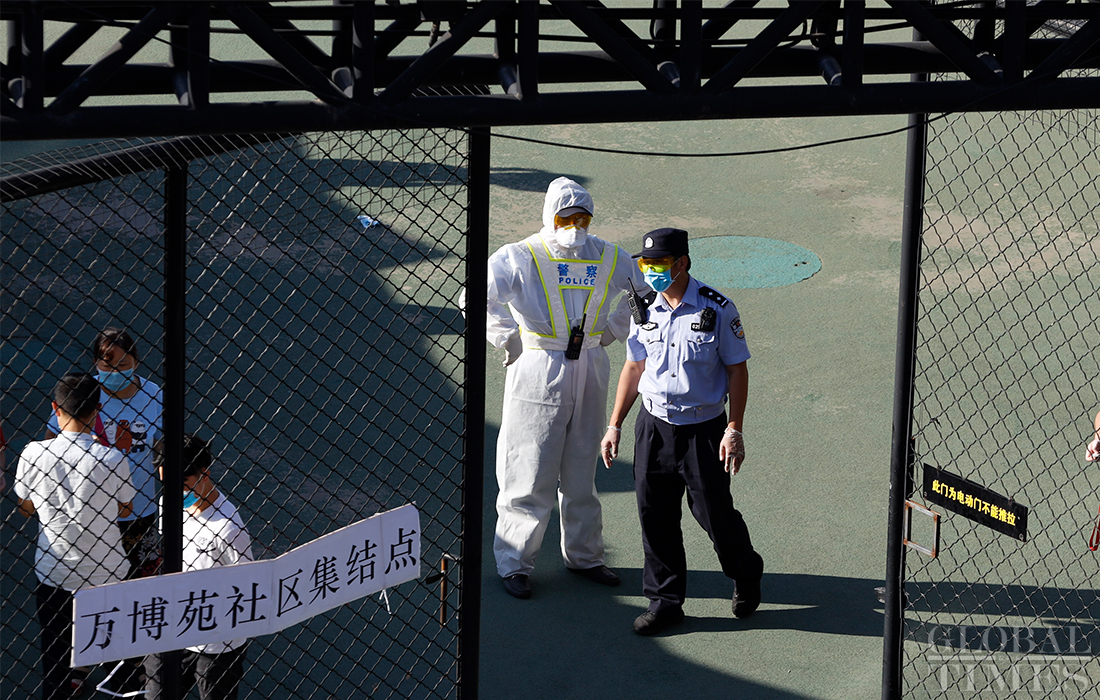
Photo: Li Hao/GT
Take guard again
After the novel coronavirus was reportedly detected on a chopping board used by a seller to process imported salmon at Xinfadi, the market as well as the majority of Beijing residents have reacted swiftly regarding the safety of salmon and the source of infection.
Yang Peng from Beijing Disease Control and Prevention Center was quoted by China Central Television (CCTV) on Sunday as saying that the investigation into the exact source of the virus at Xinfadi is still underway.
"Through genome sequencing, [we found] the strain of virus came from Europe… and is initially related to imported cases," Yang told CCTV.
Yang said that the source of the virus and how it spread is not yet known.
Ever since Xinfadi's closure, a large number of vendors flooded into other smaller wholesale markets like Dayanglu in the southeast of Beijing's Chaoyang district, resulting in a situation where demand exceeds supply.
One vegetable seller surnamed Yu said that Dayanglu market has tightened the management of visiting sellers, including temperature monitoring, regular disinfections, checking health QR codes and ID cards and checking registration information. "It's just like when we were at the highest alert level… The prices of vegetables and meat are rising, but we have enough supplies to keep up," she said.
Compared with Saturday when a large number of people rushed to markets to buy and stock up on food, there were significantly fewer people in the markets on Sunday.
A seafood seller surnamed Zhang in a wet market in Chaoyang told the Global Times on Sunday that market management had arranged for everyone to be tested the day before at a local hospital, which had eased their nerves.
Zhang said that even though she does not sell salmon, her chopping board and other equipment were tested and no trace of coronavirus was found.
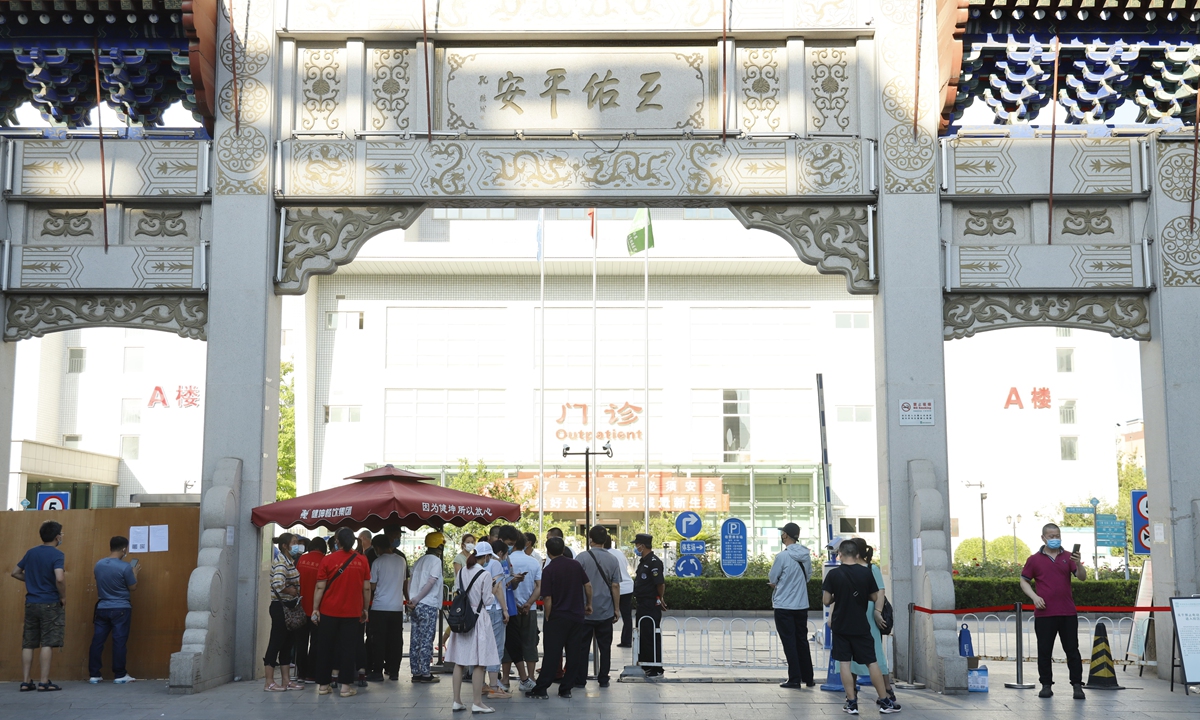
People come to Beijing You'an Hospital for COVID-19 nucleic acid tests on Sunday. Photo: Li Hao/GT
Although experts said that fish are an unlikely source of the virus, on Saturday, supermarkets and restaurants stopped offering salmon.
Zeng revealed that preliminary results from the virus gene sequencing show that the strain in Beijing this time does not resemble the type widely circulating in China.
Two samples have already been tested, and more tests are needed to determine where the epidemic is headed, he noted.
In an interview with the Global Times on Sunday, Chen Xi, an associate professor of public health at Yale University, suggested making a comparison of types of viral gene sequencing from different countries to determine whether the virus detected in Beijing comes from the same countries as the salmon was imported from.